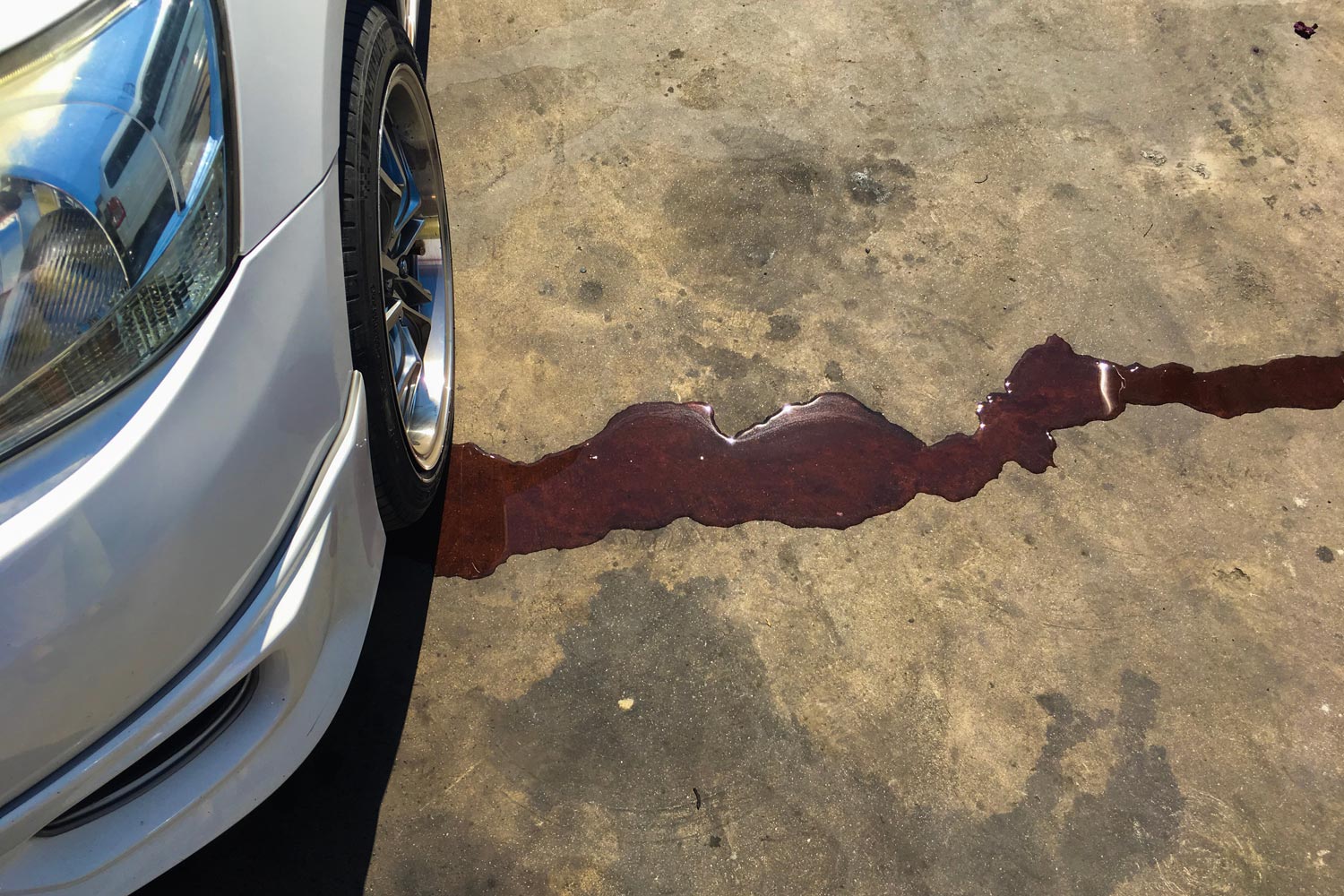What's That Puddle Under My Car? A Guide to Automotive Leaks
Some under-car puddles are more worrisome than others.
 Shutterstock
Shutterstock
Oh, no. You've just discovered some mysterious fluid pooling underneath your faithful automobile and you're starting to spiral. Should you immediately head to the mechanic? Is it even safe to drive there? This guide may help you determine the appropriate level of concern when it comes to fluid leaks.
Air Conditioning or Exhaust Condensation Discharge
If you've had the air conditioning running in your car and come out to find a pool of clear liquid at your feet, don't worry: it's likely just water, and it's completely normal. (The only exception might be if that water is dripping into the vehicle at the passenger's feet.) Clear liquid emanating from the exhaust outlet(s) is also normal.
Radiator Coolant Leakage
If you find a fluorescent green, blue, orange, yellow, or pink puddle underneath the engine area of your car, chances are it's radiator coolant. Also known as antifreeze, coolant contains ethylene glycol, which smells slightly sweet, like maple sugar or candy. Resist the urge to taste it. Look to see if there's a loose clamp on the coolant hoses between the engine and radiator. If so, your fix could be easy: in many instances you can tighten the clamp with simple hand tools, then it's as easy as topping off the coolant reservoir. If that's not the issue, you might have a broken water pump or a crack inside the radiator or heater core; for that, you'll want to visit a mechanic.
Engine Oil Leaking
Engine oil is a common driveway-staining fluid. It can seep out from the valve covers, seals, gaskets, and oil pan. You can identify it by its amber, brown, or black color and oily viscosity. You may also notice a burnt smell in the air if it falls on hot asphalt or an exhaust pipe, especially if you're in need of an oil change. You should keep an eye on the volume gathering on the ground and check the oil level to see if you need to add more. If you're frequently cleaning up a puddle of oil, it's time to have the vehicle inspected.
Brake Fluid Seepage
In order for your car to stop, it needs brake fluid, which tends to have a yellowish hue. It's slippery to the touch (but don't test that without gloves on) and smells sort of fishy. If you suspect your car has a brake fluid leak, immediately inspect the brake fluid reservoir, master cylinder, and brake lines for cracks or drips. You’ll want to take the car to a mechanic as soon as possible, ideally by tow. If you decide to drive there yourself, make sure to top up the reservoir before venturing out.
Transmission Fluid Dripping
If you own a manual-transmission vehicle, you can usually rule out a transmission fluid leak. Otherwise, if you spot a strong-smelling, bright-red or slightly brown liquid oozing from your car, you should visit the shop. Drips will come from either the transmission or the lines running from the cooler or radiator.
Power Steering Fluid
The list of new vehicles with hydraulic steering systems continues to wane, but if you own something that's five or more years old, a pink or red puddle under the front or middle of the vehicle could be power steering fluid. Check the level in the power steering fluid reservoir and look for cracks and any leaking hoses between the power steering pump and steering rack. You'll want to visit a shop as soon as possible to fix this, as you'll struggle to steer (especially at low speeds) if you run too low on fluid. Additionally, allowing the system to run dry can damage it, leading to costly repairs.
Written by humans.
Edited by humans.
 Andy Stonehouse
Andy StonehouseAndy Stonehouse literally fell into the world of auto writing while working as a ski-town journalist, and has not looked back since. A childhood spent dealing with the eccentricities of a 1976 MG Midget has made any subsequent auto experience a more safe and reliable drive. He has been blessed with nearby mountain trails and snowy roads in Colorado to do TV-adventure-styled test drives on a weekly basis.
Related articles
View more related articles